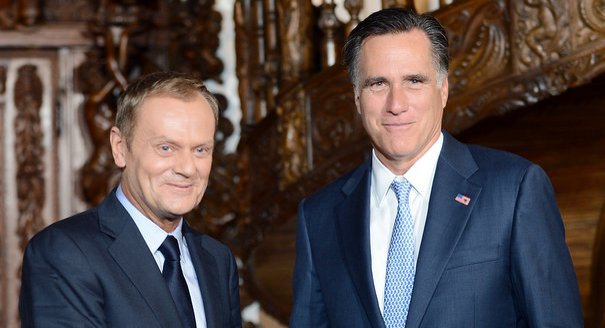After so many gaffes during his visits to London and Jerusalem, Mitt Romney managed in Poland to wrap up the last leg of his tour without any diplomatic blunders. (That his spokesman didn’t is another matter.)
He certainly tried to press what he thought were some of the right buttons in the speech he delivered Tuesday at Warsaw University. He spoke about the Polish resistance, the Polish opposition to Communist rule, the rise of the independent Solidarity movement, and the influence of the Polish-born pope, John Paul II.
He also praised Poland’s handling of its economy, especially since it is one of the few European Union countries not to have slipped into recession during the global financial crisis or the euro crisis.
Yet what was fascinating about the speech was how old-fashioned it was. How out of sync it was with the new Poland that is no longer infatuated by the United States and no longer intimidated by Russia.
Romney and his team seem unaware of the changes that have taken place in Poland since 2007 when Prime Minister Donald Tusk and his Civic Platform center-right party were elected.
No doubt recalling Poland’s heroic past was aimed at voters back in the United States, even if that does make you wonder about the state of strategic thinking in the Romney camp.
But what kind of message did the candidate for the world’s most powerful job convey to his Polish hosts?
A (relatively) younger generation leads Poland today and an even younger generation of Poles takes every advantage of EU membership by working and studying in other EU countries.
Poles can now board a bus or train and travel passport-free to most EU countries. Can you imagine how long it takes to get a visa for the United States? Take a look at the long queues outside the American embassy in Warsaw. Despite all the pleas by Warsaw, the United States has yet to waive the visa requirement for Poland.
There is also something else going on in Poland that challenges its traditional Atlanticism. It is this: the Tusk government is thinking strategically. This means that over the past few years, Warsaw has carefully analyzed its national interests and how it intends to pursue them.
The EU is crucial for Poland’s national interests.
Radek Sikorski, Poland’s foreign minister, believes a stronger and more integrated Europe is in Europe’s interests and especially in Poland’s. It would make Europe more influential and effective on the global stage.
Sikorski has been trying to persuade Germany to take the lead in pushing for a more integrated Europe. What irony for a Pole to be making such a request to his once sworn enemy!
Poland too is no longer wedded to the belief that its strategic interests can best be served by NATO alone, or other aspects of the transatlantic relationship.
And Romney bashing Russia during his Warsaw speech does not have the same impact it would have had a few years ago. The Tusk government realizes that better relations with Russia serve Warsaw’s interests best.
Of course the Pentagon’s anti-ballistic missile shield is still important to Poland. Former president George W. Bush went out of his way to involve Poland as much as possible in this defense system. For Poland, it would be an American defense guarantee that would boost security vis-à-vis Russia.
When the Obama administration changed tack by reducing Poland’s role in the deployment of the missile shield, it precipitated a strategic shift in Warsaw.
Poland now wants Europe to take its defense and security policies much more seriously. Warsaw even suggested last year that the EU have its own military planning headquarters.
This does not mean that Poland is turning against NATO. This means that Poland—just about the only country doing any strategic thinking in the EU right now—has taken stock of the United States’ strategic shift and focus from Europe to Asia and what it means for the transatlantic relationship and Europe’s security.
Romney’s speech made only passing references to NATO and no reference to the EU. This is a man who has not felt the wind of change.






